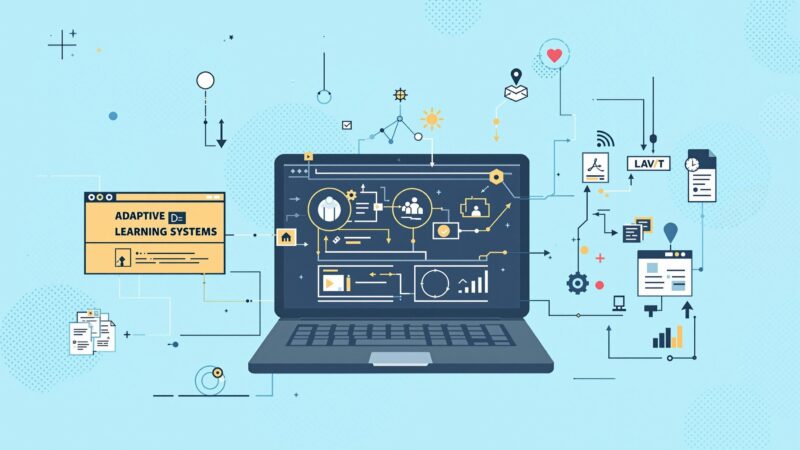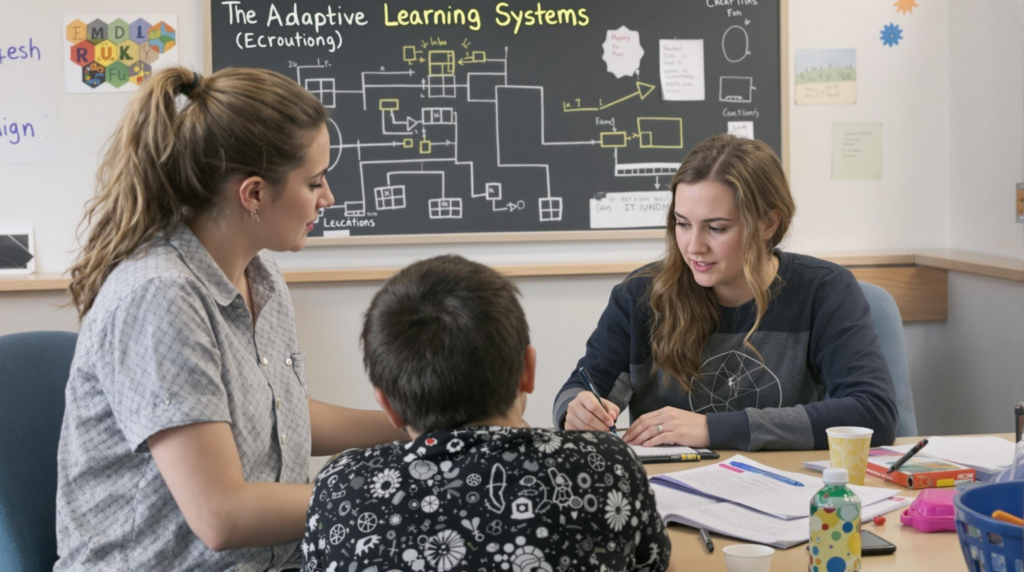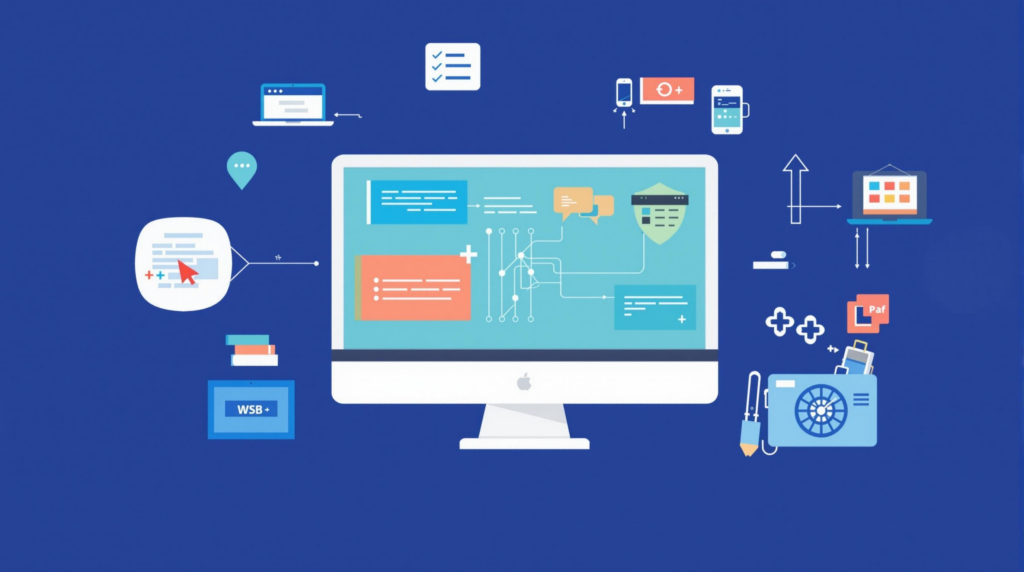Education Tailored to You: Adaptive Learning Systems

The most fascinating development in education today is new adaptive learning systems. These technologies allow for the customization of educational experiences, thereby improving the learning process for students. Rather than following the typical approach, adaptive learning systems perceive students as unique, allowing more effective and flexible learning opportunities. These systems utilize sophisticated algorithms, real-time data, and gamification to create an environment that is more productive for the individual’s skills, challenges, and preferences. This innovative approach shifts the learners’ perspective regarding educational objectives, which is more empowering because it enables them to pursue their personal academic aims. In the following sections, we will elaborate on what adaptive learning systems are, their advantages, the technologies underneath them, and their challenges and future possibilities.

The Concept of Adaptive Learning
Adaptive learning centers around developing lessons that are tailored for a particular learner. Traditional education employed the same teaching strategies, materials, and techniques regardless of context, which was detrimental to most learners. Adaptive learning challenges and goes beyond this assumption by using advanced techniques that constantly monitor student progress and adjust the curriculum to fit particular needs. This change enables more freedom to create an environment where students are provided with material suitable for their skill levels. Adaptive learning also offers students the possibility to learn autonomously as they can master concepts at their own pace and advance to more complex topics gradually. Understanding and self-esteem are enhanced, which motivates students and makes the learning experience worth the effort.
Benefits of Adaptive Learning Systems
Adaptive learning systems can be an invaluable asset to both students and education organizations alike. Here are a few details that have utilized adaptive learning in a positive manner:
Tailored Learning Paths: Each student can pursue a learning path that is customized to his/her goals and knowledge level.
Increased Engagement: Students as well as teachers feel more motivated and engaged in the process of learning because of its interactive nature.
Improved Achievement: Improved content retention and performance due to custom content leads to improved academic achievement.
Continual Self-Assessment: Students get real-time feedback on their understanding of a topic and can alter their attempts immediately.
Adaptive learning systems are unique compared to traditional learning due to their capabilities with certain features.
Technologies Behind Adaptive Learning
The most challenging part of adaptive learning systems is the sophisticated technology which computes, scans, and analyzes data for processing in real time. One major aspect of this is the use of Artificial Intelligence (AI) integrated with machine learning approaches which allow the systems to capture the relevant interactions of learners and tailor the content accordingly. These powerful technologies process tremendous sets of data and look at different factors such as a student’s academic performance and their level of participation and engagement in class. Another distinguishing feature of analytics is the functions that help instructors monitor progress and learning achievement, identify learning difficulties, and plan future needs. Incorporating these technologies increases the effectiveness of adaptive learning systems while ensuring no student is left behind.
| Technology | Description | Impact on Learning |
|---|---|---|
| AI Algorithms | Used to customize the learning experience | Personalized content delivery |
| Machine Learning | Adapts based on user interactions | Continuous improvement in learning paths |
| Data Analytics | Tracks student progress over time | Informs educators about needs |
Technology Description Impact on Learning Technology Description Impact on Learning AI Algorithms Used to customize the learning experience Personalized content delivery AI Algorithms Used to customize the learning experience Personalized content delivery Machine Learning Adapts based on user interactions Continuous improvement in learning paths Machine Learning Adapts based on user interactions Continuous improvement in learning paths Data Analytics Tracks student progress over time Informs educators about needs Data Analytics Tracks student progress over time Informs educators about needs
Challenges and Limitations
Even if adaptive learning systems seem beneficial, they encounter some problem areas that may pose challenges to their overall efficacy. One of these problems manifests itself through adaptability; not all learners have the necessary devices, which restricts the reach of these sophisticated learning aids. Besides, there is a gaping lack of teacher training. Teachers should be able to operate adaptive learning programs and know how to interpret the data to utilize it effectively. Lack of understanding and information may restrict the use of these systems, which, in turn, is harmful to learners who need them.

Future Trends in Adaptive Learning
Looking ahead, one can tell that a few patterns are bound to shape the future of adaptive learning. The use of gamification, which combines game mechanics with learning, is also on an upward trend. This helps in keeping learners interested and promoting competition and collaboration among them. Another trend is the rise of mobile learning, as more and more companies recognize the need to support learning on various devices and not just within the confines of a classroom. Moreover, it is likely that adaptive learning will be used in conjunction with other educational technologies that seek to develop an integrated system for learning, which fundamentally alters the way students learn, motivates them, and inspires them.
Conclusion
Technologies that use adaptive learning methods are developing new, student-centered and interactive education systems. These systems enable students with varying learning approaches and paces to access specialized learning pathways through the utilization of modern technologies. The change from traditional approaches towards new methodologies of pedagogy influenced by adaptive learning is not only a shift within the confines of a particular subject; it is part of the wider attempt to build educational institutions that are responsive to the learning needs of all students. When implementing these systems, it is necessary to address existing challenges while creatively integrating prospective solutions.
Frequently Asked Questions
- What is an adaptive learning system? An adaptive learning system is a technology-based approach that customizes educational experiences according to the individual needs of students.
- How does adaptive learning improve student engagement? By offering interactive and tailored content, adaptive learning keeps students interested and invested in their education.
- What role does technology play in adaptive learning? Technology, particularly AI and data analytics, is essential in designing systems that can adjust to student input and progress in real time.
- What challenges do educators face with adaptive learning? Educators may encounter challenges such as accessibility issues and the need for proper training to utilize adaptive systems effectively.
- What are the future trends in adaptive learning? Future trends include increased use of gamification, mobile learning applications, and more comprehensive integrations with other educational technologies.
Comments are closed.